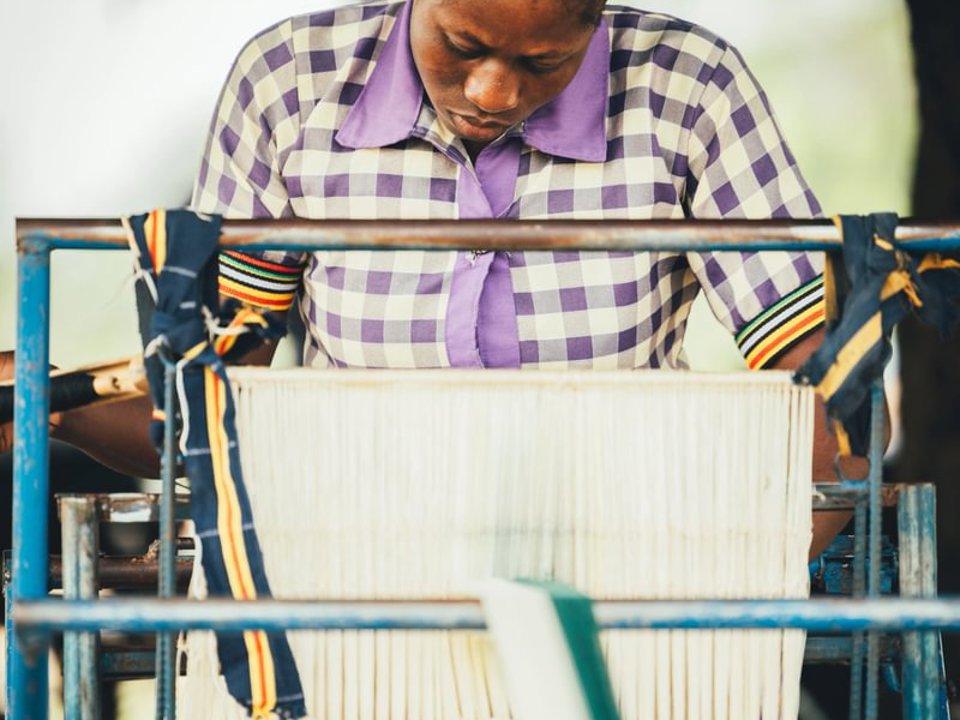Threads of hope – textile workers
Upper East Province, Ghana
These skilled workers produce highly desirable products. But with few safety and health safeguards in place, the women are at risk of musculoskeletal disorders. They also make little money. This must change. In 2024, we documented practices and challenges. We are working with partners to make our recommendations for an improved working environment a reality.
Watch our films
Our 2025 documentary, Threads of hope, highlights the progress made in-territory for the women and their improving working conditions. Watch our first film, Threads of pain, to find out what working life used to be like for the textile weavers.

Why this project
The textile weavers of Upper East Ghana are highly skilled and the beautiful textiles they produce are in demand.
This work is invariably done by girls and younger women. As individual home workers, they use manual hand machines. Each line of woven cloth is conducted by hand and a simple scarf takes two weeks to craft.
Musculoskeletal disorders (MSDs) are common. The women develop chronic feet and leg deformities, as the manufacturing process requires repetitive foot pressure on the weaving machine at an age when their bodies are still growing. They can develop raised arches in their feet, which makes walking hard for the rest of their lives.
They also use very heavy rocks to hold tension on strands of cloth. Manual handling these rocks for eight to 10 hours a day results in lifelong back and posture issues.
Despite their skill and hard work, the women retain little of the product value and are invariably impoverished. This can lead to sexual exploitation in the workplace in order for them to survive.
Project goals
These are based on the risk assessment recommendations for a safer and healthier working life for the textile workers and include both short- and long-term targets. You can download the risk assessment at the bottom of the page.
Provide workers with the tools and facilities to conduct their work in a safe and healthy way.
Support the workers and community to make the transition from informal to formal economy.
Educate and train the workers on the hazards and risks of their working practices and explain how these can be avoided.
Educate and train equipment manufacturers on the hazards and risks of the communities’ working practices and the impact of poorly manufactured equipment on the workers to influence change in production processes.
Raise awareness and gain support from partners, governments and interested parties to support help the workers change their current way of working through investment, training and provision of safety supplies.
“There are days when you wake up and can’t feel your feet. When that happens, it’s impossible to work because you can’t operate the machine.”
Ayorka
- Job role
- Textile weaver and co-operative chairwoman
Who is involved
- Commonwealth Business Women Africa (CBW-Africa)
- Commonwealth Enterprise and Investment Council (CWEIC)
- Embassy of Germany
- Government of Ghana
- International Labour Organization (ILO)
- International Social Security Association (ISSA)
- IOSH consultants
- Local IOSH members
- Rotary Club
- Shea butter farmers and textile weavers
- UK High Commission Ghana
- United Nations Office for Project Services (UNOPS)
Ghana is at a pivotal moment in the development of its textiles and garment sector
International Labour Organization
Progress so far
- Local occupational safety and health experts and IOSH members conducted an impartial risk assessment to assess conditions (July).
- Formed a co-operative, Lana Empire Foundation Africa, bringing the women into the formal economy).
- Registered the co-operatives through the Food and Drug Administration approval process. This means they are able to sell their products and can quantify the quality to local and international markets at better price points (September).
- IOSH and partners worked with the loom and pedal manufacturers to eliminate risk by educating them about the injuries and challenges the women experience (October).
- Lana Empire Foundation acquired properties that are being converted into a warehouse for the textile weavers. This means they now have shelter from extreme weather conditions and the risk of carrying the looms has been removed (November).
- The properties have been converted into a warehouse for the textile weavers to work (January).
- International Labour Organization (ILO) is working to identify how it can support the programme of work for future roll out and how it can influence within the upper east region (February).
- New, safer machines have been created for better working practices, with wider pedals for better foot support and to reduce risk of repetitive strain injury. They have higher looms to eliminate musculoskeletal pain and potential injuries. The machines are smoother, so workers don't cut themselves on sharp, unfinished edges (March).

Get involved
We welcome your support in helping people stay safe at work. It can change the lives of the most vulnerable workers. Find out more about these projects and the work we are doing.
 IOSH
IOSH